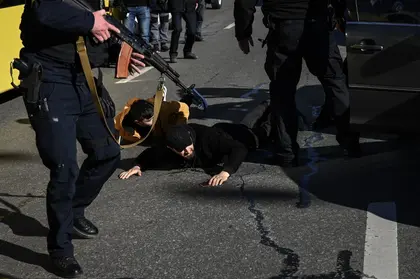"Hands in the air! Documents out!" shouted Ukrainian policemen as they levelled their guns at two suspected collaborators moments after they docked their boat near the city of Kherson.
The euphoria of Kherson's liberation in November has proven to be short-lived.
JOIN US ON TELEGRAM
Follow our coverage of the war on the @Kyivpost_official.
Just weeks after Russians retreated from the southern Ukrainian city, authorities are working to hunt down collaborators who aided Moscow during the occupation of Kherson.
The two men held at gunpoint came from an island on the Dnipro River in the proverbial grey zone separating the Ukrainian-controlled western bank from the Russian-occupied east.
"Evacuations are only authorised at the port. It's illegal here," one of the police officers tells AFP.
At the port, "officials in charge of 'stabilisation measures' check if people were involved" with the Russian occupiers, he adds.
Since pushing out the Russians, the river is now the new, major frontline of the war in southern Ukraine.
A barrage of missiles halts the impromptu interrogation as the police and suspected collaborators duck for cover.
- Smoke out collaborators -
The liberation of Kherson marked a major victory for Ukraine and an embarrassing failure for the Kremlin -- in what was the latest in a string of setbacks that have seen Kyiv seize the initiative in the war.
Even so, Kherson is far from tranquil as police keep tight control, with checkpoints surrounding the city and patrols roaming its streets.

N. Korean Troops Massed in Russia to Enter Ukraine War ’Soon’: Pentagon Chief
Throughout Kherson, officers inspect identification papers, question residents and search cars hoping to smoke out collaborators -- some of whom they fear are still providing information to their old masters.
"Some people lived here for more than eight months, working for the Russian regime. But now we have information and documents about each of them," regional governor Yaroslav Yanushevych tells AFP.
"Our police know all about them. Each and every one of them will be punished," he adds.
At a roundabout near a bridge leading to the waterfront's industrial area, an old man approaches police officers screening drivers, hoping to find a place to fill two jugs with water.
"So, you say you've been living here, but you don't know where the water points are?" a policeman fires back at the man.
To prove his identity, the man pulls a well-worn photocopy of his ID from his pocket.
The questioning does not end there.
At the city's train station, AFP journalists saw policemen take the few civilians hoping to board a train into a separate room where they were quizzed by five officers.
-130 arrested -
A lot of signs calling for locals to help in the hunt for collaborators also began to pop up.
"Send us information about the traitors here," one of them reads, with a QR code linking potential informants to an app and a phone number.
For the regional governor, the campaign "helps us identify them, know if they are on the territory we control".
"We get most of our information from informal conversations with locals... We also analyse social media and monitor the internet," Andriy Kovanyi, the head of public relations for Kherson regional police, tells AFP.
To date, more than 130 people have been arrested in the region of Kherson for collaborating with the Russian occupiers, Deputy Interior Minister Yevhen Yenin says.
Many locals, who spoke to AFP, support the initiative.
"It's always good to help find a collaborator or a traitor. We need to help our armed forces catch the people who worked for Russia," says Pavel, 40.
The search for collaborators comes as Russian forces on the opposite bank of the Dnipro continue to pummel the city with artillery and missile strikes -- targeting Kherson energy infrastructure or residential areas and killing several civilians in recent weeks.
"Our houses get shelled too, and I think it's because collaborators help to target our homes," Iryna, 35, tells AFP.
Another resident, Vyacheslav, 47, argues that "all collaborators already fled to the other side" of the Dnipro.
You can also highlight the text and press Ctrl + Enter






